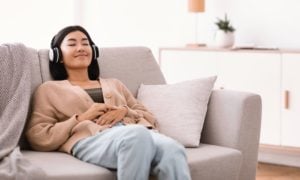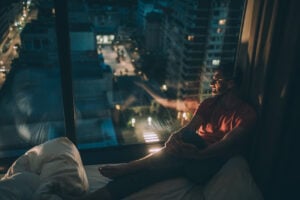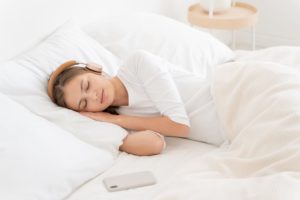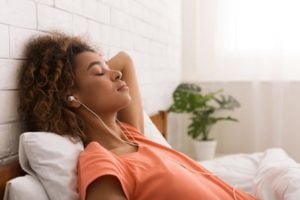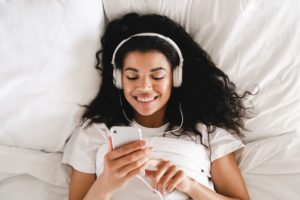What Is Green Noise and How Can It Help You Sleep?
- Green noise amplifies mid-range frequencies with uniform intensity.
- Green noise sounds are perceived as similar to ocean waves or a stream.
- There is limited research that shows green noise benefitting sleep, but background noise can help mask noisy environments that disrupt sleep.
Green noise is a variant of white noise that some experts suggest may help sleep. While white noise contains equal volumes of all the sound frequencies the human ear can hear, green noise amplifies the frequencies in the middle of that range.
Many people use white noise to block out ambient sounds and help them sleep better. Other “colors” of sound, such as pink, brown, and green, are also being touted as helpful for sleep. While research into the effects of green noise on sleep is limited, it is gaining popularity on social media as a useful tool to help people fall asleep faster.
Is Your Troubled Sleep a Health Risk?
A variety of issues can cause problems sleeping. Answer three questions to understand if it’s a concern you should worry about.
What Does Green Noise Sound Like?
The more powerful mid-range frequencies in green noise mimic sounds found in nature, like the ocean or a stream. White noise retains high frequencies, which can give it a continuous hissing sound, similar to the static on a television or radio. By limiting the harsh high tones, green noise tends to sound more calming than white noise.
“Different frequency concentrations are grouped as colors. White has a hissing tone to it, while green has more middle range, and brown has more low bass ranges.”
Dr. Abhinav Singh, Sleep Physician
Pink and brown noise are other sounds similar to green noise that center around mid-range and lower frequencies. Like green noise, pink noise is also said to sound more natural, like a water sprinkler or falling rain. Brown noise, which focuses on low tones, sounds more like thunder or a jet engine.
How Can Green Noise Benefit You?
While many people are promoting use of green noise to help with sleep, there is limited data on how green noise can benefit sleepers. Researchers have evaluated white and pink noise to see if they provide any benefits for sleep and found mixed results on the benefits of white noise.
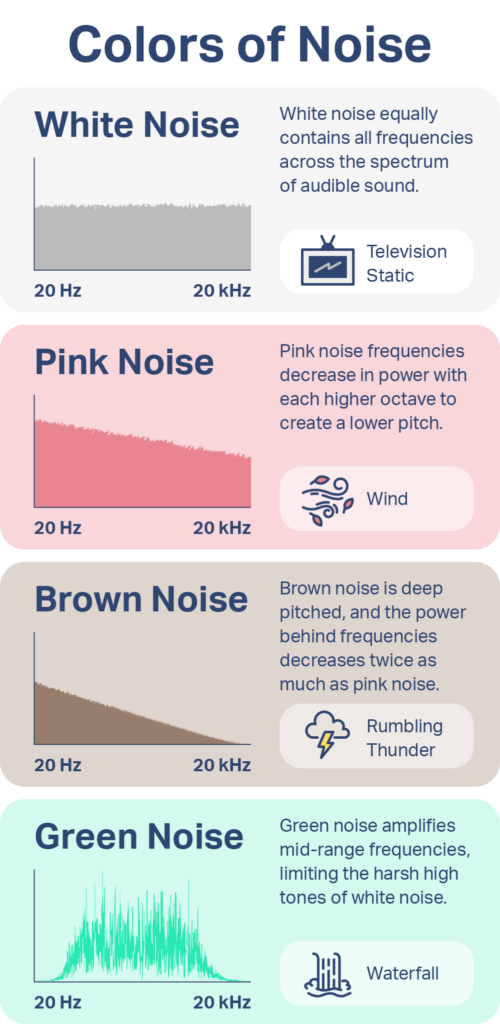
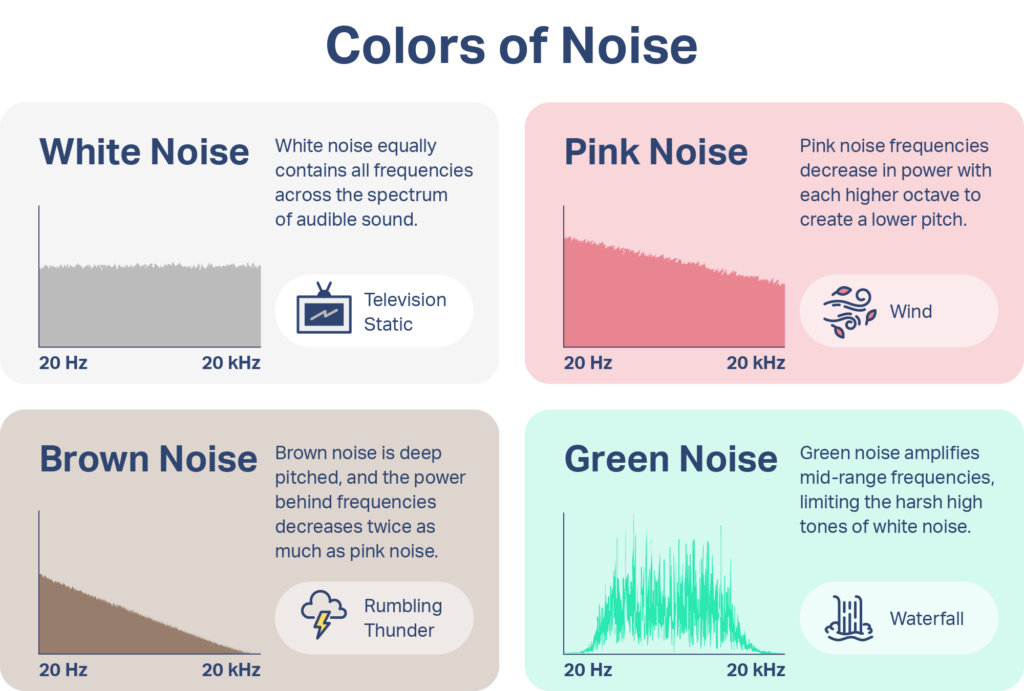
Some research suggests that people who have difficulty sleeping in a noisy environment may get better rest when they sleep with white noise at night. Other research has found that adults may fall asleep faster when they listen to white noise at bedtime. White noise may also improve cognitive symptoms in people with attention-deficit/hyperactivity disorder and memory in older adults with Alzheimer’s.
Researchers have found that pink noise, which is similar to green noise in its softer sound, might also improve sleep quality . Some experts believe that green noise might work even better for sleep than white noise because it removes the harsher high frequencies of white noise.
Who Might Benefit Most from Green Noise?
There isn’t enough research to know who might benefit from green noise the most. People who need to block noises from their surroundings may want to test if green noise helps them fall asleep.
For example, shift workers who need to sleep when outside noises like city traffic are particularly loud might benefit from a sound machine . There is also evidence that infants can benefit from sounds at night, and it might contribute to a shorter period of crying.
Green noise might also be beneficial for people who have racing thoughts and anxiety at night. The sounds in green noise might give them something to focus on in place of unwanted thoughts.

How Do You Use Green Noise for Sleep?
Although data are limited, people curious about green noise can try it at night to see if it works for them. To start, try different green noise options available on streaming platforms. Experiment with the volume to find a level that is soothing and not too loud for sleep. It might take a while to adjust to new sounds, so allow a few nights to decide whether it works for you.
In addition to experimenting with green noise, it can be helpful to make changes to improve sleep habits, including:
- Follow the same bedtime and wake time each day
- Limit the use of caffeine and alcohol, especially at night
- Try not to eat a heavy meal before going to bed
- Dim the lights and avoid using screens before trying to sleep
- Get some exercise, but not close to bedtime

Still have questions? Ask our community!
Join our Sleep Care Community — a trusted hub of sleep health professionals, product specialists, and people just like you. Whether you need expert sleep advice for your insomnia or you’re searching for the perfect mattress, we’ve got you covered. Get personalized guidance from the experts who know sleep best.
References
5 Sources
-
Riedy, S. M., Smith, M. G., Rocha, S., & Basner, M. (2021). Noise as a sleep aid: A systematic review. Sleep Medicine Reviews, 55, 101385.
https://pubmed.ncbi.nlm.nih.gov/33007706/ -
Ebben, M. R., Yan, P., & Krieger, A. C. (2021). The effects of white noise on sleep and duration in individuals living in a high noise environment in New York City. Sleep Medicine, 83, 256–259.
https://pubmed.ncbi.nlm.nih.gov/34049045/ -
Zhou, J., Liu, D., Li, X., Ma, J., Zhang, J., & Fang, J. (2012). Pink noise: Effect on complexity synchronization of brain activity and sleep consolidation. Journal of Theoretical Biology, 306, 68–72.
https://pubmed.ncbi.nlm.nih.gov/22726808/ -
Cheng, P., & Drake, C. L. (2022, November 3). Sleep-wake disturbances in shift workers. In C. A. Goldstein (Ed.). UpToDate., Retrieved April 3, 2023, from
https://www.uptodate.com/contents/sleep-wake-disturbances-in-shift-workers -
Pickens, T. A., Khan, S. P., & Berlau, D. J. (2019). White noise as a possible therapeutic option for children with ADHD. Complementary Therapies in Medicine, 42, 151–155.
https://pubmed.ncbi.nlm.nih.gov/30670235/


